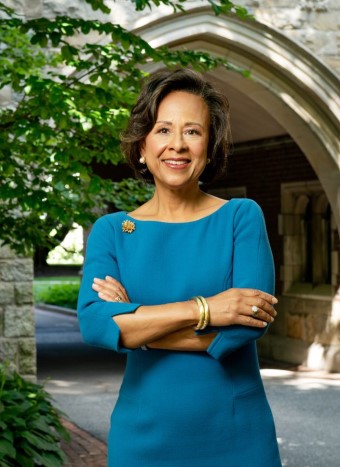
I recently had dinner with an inspiring group of Wellesley students who gather nightly in Homestead to share a meal they have cooked together. They are the members of Wellesley College’s sustainable living cooperative, SCoop for short, which has been going strong since 2008. Amid the clink of dishes as food was passed, we enjoyed good company and a delicious meal. But it was more than a dinner.
As we talked, I saw how these young women had created something special that went beyond traditional ideas of sustainability (“buying local,” composting, reducing waste, for example). While they are certainly dedicated to sustainable living, SCoop’s approach to sustainability is also “in subtle and large ways … the practice of sustaining ourselves, in all our complex identities,” Meredith Wade ’17 told me. During my visit, I saw a group of young women deeply invested in practicing a kind of emotional sustainability—a way of living and learning together that uses shared purpose to bridge difference and live in a spirit of communal support.
And the time is right to strive for something more. Wellesley has declared this the Year of Sustainability (see “Road Map to Sustainability”). By looking to SCoop’s example, we can reimagine and expand sustainability’s important environmental goal. We can deepen our ethic of care and fulfill the promise of this community to include and sustain each and every member.
Like any community, SCoop has had to face challenges, learn, and grow. In particular, during one semester a few years ago, tensions over difference flared; the group’s members struggled with their own biases. Three housemates of color felt they needed to leave SCoop. “Their absence was palpable and heartbreaking,” Meredith said. It was “a painful wake-up call.” The young women turned to what they knew: having those difficult, often late-night conversations about how to make things better. The conversations sparked real changes, with members rethinking their assumptions and their worldviews, undergoing difficult self-reflection, and organizing cross-cultural communication training for all its members. Students of color now make up a majority of SCoop’s membership.
A sustainable community, they’ve learned, must be diverse and must be based in respect. They seek this out in the application process, which entails an interview. “We try to get to know everyone on a personal level so that we can become a house full of team players with different ideas, approaches, and cultural backgrounds,” Sabrina Ahmed ’17 told me. Their differences focus their energies. “Each decision we make together, especially the ones that split us apart [at first], provides information,” Meredith explained. “Working through [difference] allows us to learn how to love each other more deeply, and how to advocate for our own needs while respecting and accommodating each others’.”
The work is worth it, they say, and it sustains them emotionally. “I learned that I can listen to stories till 4 a.m.,” said Sabrina, as long as her cup of tea always gets a refill. She learned how to cook three courses for 20 people with different dietary needs. “I learned how my demeanor can affect the mood of those around me and how contagious positive energy can be,” she said. In other words, “I learned how to make different people happy, and how, in turn, that can make me happy.”
SCoop also teaches us that if you bring a range of voices together over a dinner table, you’re bound to get great ideas. Padya Paramita ’18 remembered a conversation that led members to come up with the idea for the group’s “Layers Party,” a winter clothing exchange and celebration. Students come to Homestead with warm winter clothes they want to donate, and they can pick up clothes they need.
In this Year of Sustainability, let’s look to these young women as a model of what hard-won inclusion looks like—and how it can be part of an emotional sustainability to which we can all aspire. They show us how our most meaningful (sometimes difficult) conversations and interactions can actually be a form of sustenance and an opportunity for growth. And their example invites us to think about how to sustain our own communities, wherever we may be.
Leave it to Wellesley women to find a new way to practice sustainability.






